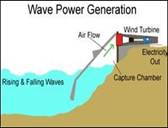The ocean can be a great place to swim and play, it may also be useful in another way. Some scientists think that waves could help make electricity.
“Have you ever been on a surfboard or boat and felt yourself being lifted up by a wave?” asked Jamie Taylor of the Wave Energy Group in Scotland. “There is certainly a lot of energy in waves.”
Scientists are working on using that energy to make electricity. The United States and a few other countries have started doing research on wave energy, and it is already being used in Scotland.
Most waves are created when winds blow across the ocean. “The winds start out by making little ripples (波纹) in the water, but if they keep on blowing, those ripples get bigger and bigger and turn into waves,” Taylor said. “Waves are one of nature’s ways of picking up energy and then sending it off on a journey.”
When waves come towards the coast, people can set up dams(大坝) to block the water and send it through a large wheel called a turbine(涡轮). The turbine can then power an electrical generator(发电机).
We will never run out of wave power. Besides, wave energy does not create the same pollution as oil and coal do.
Oceans cover three quarters of the earth’s surface. That would make wave power seem perfect for creating energy around the world. But there are some disadvantages that need us to pay more attention to.
Jamie Taylor said that wave power still cost too much money. He said that its influence on animals in the sea is still unknown. Besides, wave power would get in the way of fishing and boat traffic.
With more research, “Many of these problems might be solved,” Taylor said. “Finding more energy sources(资源) is very important, for traditional sources of energy like oil and gas may run out some day.”
In the future, when you turn on a light button, an ocean wave could be providing the electricity!

小题1:We can learn from the passage that__________________.
| A.almost every country is making use of the wave power at present |
| B.it is necessary for us to develop wave power instead of oil and coal |
| C.wave power will be sure to make some bad influence on sea animals |
| D.scientists are making efforts to find new ways of fishing and boat traffic |
小题2:What does the fourth paragraph tell us?
| A.Why scientists are doing the research on wave power. |
| B.What experience that scientists have achieved so far. |
| C.How the wave energy forms and grows bigger. |
| D.Which countries are trying out wave power. |
小题3:What’s the writer’s attitude towards wave power?
| A.The writer believes that wave power will be used widely by man. |
| B.The writer doubts if wave energy can be changed into electricity. |
| C.The writer is sure the experiments will come to the end some day. |
| D.The writer thinks that wave power isn’t worth researching at all. |
小题4:What can be the best title for the passage?
| A.Sea Animals and Wave Power. |
| B.How Do We Get Wave Energy? |
| C.The Advantages of Wave Power. |
| D.Can Waves Make Electricity? |